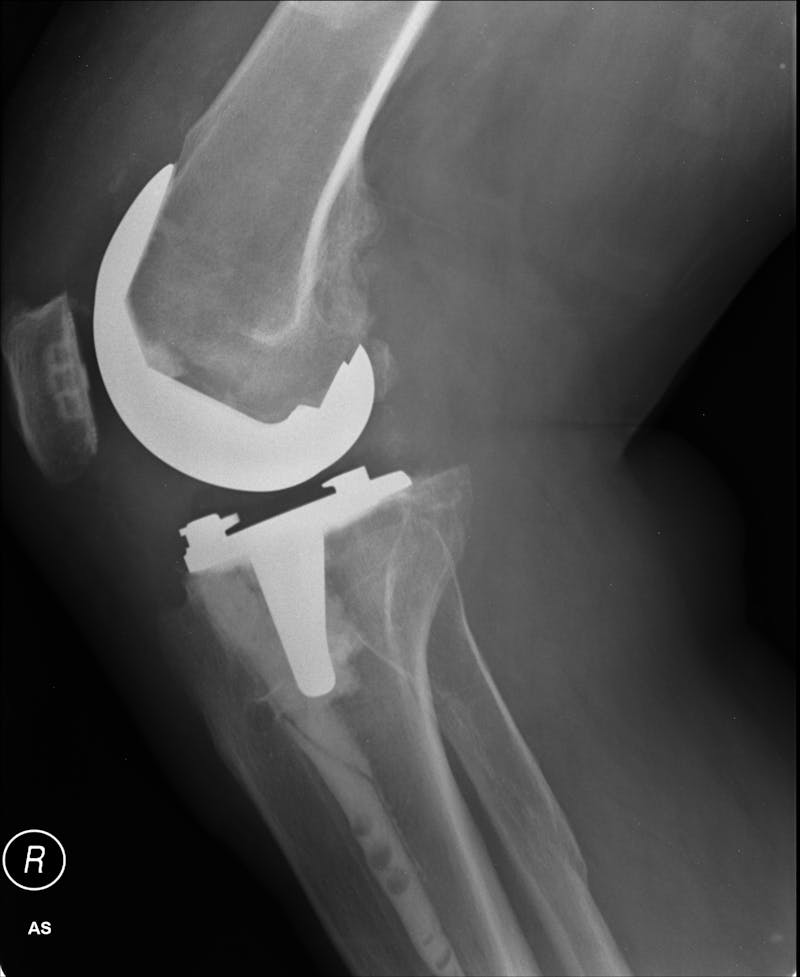Knee replacement

Knee replacement, also called knee arthroplasty, is a surgical procedure to replace all or part of the knee joint with a prosthesis. The aim of the surgery is to remove pain and restore mobility. During the surgery, the surgeon removes the damaged part of the knee joint and replaces it with a material such as metal, ceramic or plastic. It is usually performed to relieve severe pain caused by osteoarthritis. When the knee joint is damaged, people often feel pain and stiffness. This causes difficulty in performing daily tasks like climbing stairs, walking, and standing.
The ends of the bones are covered with a smooth cartilage that allows the bones to glide smoothly against each other. Arthritis of the knee occurs when this cartilage is worn away, thus, causing the bones in the affected area to rub against each other. Due to which the bones becomes eroded, causing severe pain and limited joint mobility. Knee replacement surgery is also recommended to help patients who have a rheumatoid arthritis or post traumatic arthritis.
What causes knee replacement surgery necessary?
Osteoarthritis
Osteoarthritis is the most common form of knee arthritis. It is an age related type of arthritis and mostly affects middle-aged and older adults. It is sometimes called wear and tear arthritis.
Rheumatoid arthritis
It is an autoimmune disease that causes immune system to attack the membranes in the knees. This results in pain, swelling and stiffness in the joint.
Post-traumatic arthritis
Post-traumatic arthritis is caused by the wearing out of knee joint due to some serious knee injury.
When a knee replacement is needed?
You might need a knee replacement surgery if:
- Your knee is severely damaged by arthritis or injury.
- The pain has not responded to other methods of pain relief.
- You experience severe pain, stiffness that affects your daily life and activities.
- The mobility is reduced and you feel pain even while resting.
What are the different types of knee replacement surgeries?
The two most common types of knee replacement surgeries are:
Total knee replacement (TKR)
Total knee replacement is the most common type and recommended if other treatments have not worked. In total knee replacement, surgeon resurfaces all three compartments of the knee joint. After surgery, physical therapy is important and will begin as soon as possible.
Partial Knee Replacement (PKR)
Partial Knee Replacement, also called unicompartmental knee replacement, is an option if only one of the three compartments of the knee is to be replaced. Only the affected portion of the knee is replaced in order to preserve as much healthy bone as possible. The recovery time for a partial knee replacement is shorter than that of the total knee replacement
Risks
Just like any surgical procedures, knee replacement surgery can have risks, but they are usually minor and can be treated successfully. Complications tend to be higher with total knee replacement than partial knee replacement and these include:
- Infection: generally treated with antibiotics
- Stiffness
- Blood clots in the leg veins
- Allergic reaction
- Dislocation of the prosthesis
- Damage to the surrounding vein, nerves, or arteries
After surgery
After surgery, your surgeon will provide you proper instructions regarding your exercise routine, diet, medications, sign and symptoms. Recovery time is different for every individual. Make sure to visit your orthopedic surgeon for a routine follow up examinations and x-rays.
DISCLAIMER
This web page provides general information and discussions about health, medicine and related subjects. The information and other content provided on this website, or in any linked materials, are not intended and should not be construed as medical advice, nor is the information a substitute for professional medical expertise or treatment.
The content is for information purpose only and is not a medical advice. Qualified doctors have gathered information from reputable sources; however Credence Medicure Corporation is not responsible for errors or omissions in reporting or explanations. No individual should use the information, resources and tools contained herein to self diagnose or self treat any medical condition.
If you or any other person has a medical concern, you should consult with your health care provider or seek other professional medical treatment. Never disregard professional medical advice or delay in seeking it because of something that have read on this blog or in any linked materials. If you think you may have a medical emergency, call your doctor or emergency services immediately.
The opinions and views expressed on this blog and website have no relation to those of any academic, hospital, health practice or other institution. Credence Medicure Corporation gives no assurance or warranty regarding the accuracy, timeliness or applicability of the content.
